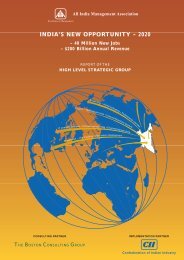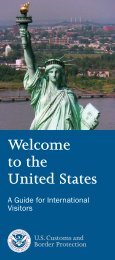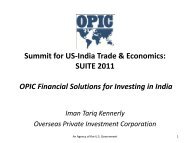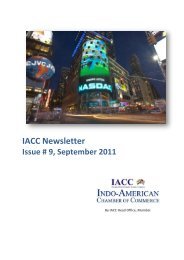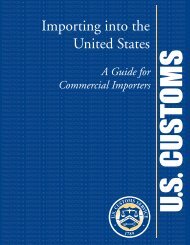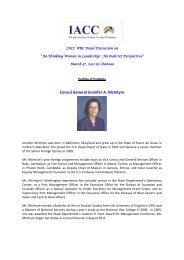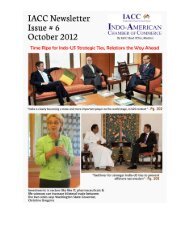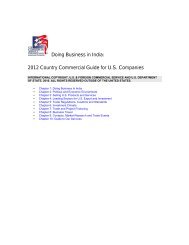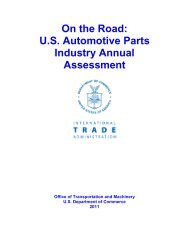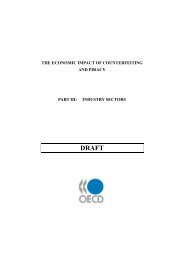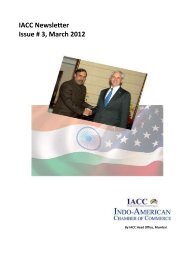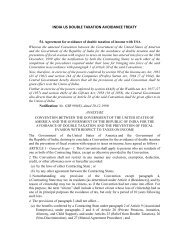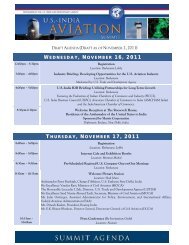Download the PDF version here - Indo-American Chamber Of ...
Download the PDF version here - Indo-American Chamber Of ...
Download the PDF version here - Indo-American Chamber Of ...
Create successful ePaper yourself
Turn your PDF publications into a flip-book with our unique Google optimized e-Paper software.
The development comes even as global pharmaceutical giants are making a bee-line to India to tie-up<br />
with local drug makers to sell generic <strong>version</strong>s of patent-losing drugs globally in order to shore up <strong>the</strong>ir<br />
revenues as nearly $150 billion worth of drugs are expected to lose <strong>the</strong>ir patents by 2015.It also comes<br />
at a time when Pfizer, <strong>the</strong> world's largest drug maker, is in <strong>the</strong> middle of a major restructuring following<br />
its $68-billion merger with Wyeth in 2009 and is focused on its core pharmaceuticals business.<br />
Both companies said in a joint statement that <strong>the</strong> reason for terminating <strong>the</strong> agreement was due to "<strong>the</strong><br />
individual priorities for <strong>the</strong>ir respective bio similar businesses, it is in <strong>the</strong>ir best interest to move forward<br />
independently."<br />
In October 2010, Pfizer entered into a deal with Biocon to sell <strong>the</strong> Indian drug maker's bio similar<br />
<strong>version</strong>s of diabetes treatment insulin. Under <strong>the</strong> deal, Biocon was paid $200 million up front and was<br />
also be eligible to receive additional development and regulatory milestone payments of up to $150<br />
million in addition to payments related to sales of <strong>the</strong>se medicines (See: Pfizer, Biocon enter into deal<br />
for bio similar insulin)<br />
Under <strong>the</strong> agreement, Biocon would be responsible for developing and manufacturing <strong>the</strong> treatments.<br />
Its responsibility was also to secure regulatory approvals, and Pfizer was to have got exclusive rights to<br />
commercialize Biocon's drugs - recombinant human insulin, Glargine, Aspart and Lispro – globally,<br />
excepting in countries like Germany, India and Malaysia, w<strong>here</strong> Biocon was to share co-exclusive rights<br />
with Pfizer. With <strong>the</strong> deal being terminated, <strong>the</strong>se rights have now reverted to Biocon and all insulin<br />
distributed under <strong>the</strong> brand name Univia and Glarvia will be exclusively manufactured, supplied,<br />
marketed, sold and supported by Biocon.<br />
Biocon chairman Kiran Mazumdar-Shaw, who set up <strong>the</strong> company in her garage in 1978, said that<br />
Biocon will retain a "significant part" of <strong>the</strong> $200 million that Pfizer paid upfront as part of <strong>the</strong> deal and<br />
will also receive an additional amount from <strong>the</strong> New York-based company for annulment of <strong>the</strong> deal.<br />
Biocon would forfeit up to $150 million of payments linked to regulatory and sales milestones that it<br />
could have received from Pfizer over <strong>the</strong> three to five years from 2010, she added.<br />
Citing people privy to <strong>the</strong> deal, The Economic Times reported that "Pfizer was unhappy with <strong>the</strong><br />
progress on <strong>the</strong> partnership and often complained that Biocon lacked systems and processes to deliver<br />
on commitments built into <strong>the</strong> product licensing deal." As part of <strong>the</strong> agreement, Biocon was to have set<br />
up an insulin manufacturing plant in Malaysia, but was unable to do so within <strong>the</strong> stipulated time frame.<br />
Although <strong>the</strong> deal was inked in October 2010, Biocon announced in September 2011, that it would<br />
invest $161 million (Rs. 715 crore) to set up a bio-manufacturing and R&D facility in Bio-XCell, a biotech<br />
park and ecosystem in Iskandar Malaysia, Johor, and <strong>the</strong> facility was to become operational by 2014<br />
(See: Biocon to set biopharmaceutical plant, R&D centre in Malaysia).<br />
The $14-billion global insulin market is dominated by three drug makers, Sanofi, Eli Lilly & Co and Novo<br />
Nordisk. A deal with Pfizer would have given Biocon <strong>the</strong> advantage of <strong>the</strong> pharmaceutical giant's<br />
worldwide marketing network.Biocon said that it will continue to work with its existing partners in<br />
several markets and will pursue a commercial strategy on its own and through new alliances in o<strong>the</strong>r<br />
markets.<br />
Click <strong>here</strong> for index<br />
Tulip Telecom ties up with US' Polycom<br />
Enterprise data services provider Tulip Telecom tied up with US-based Polycom to offer high definition<br />
managed video conferencing solution to its customers in India. Tulip will host cloud-based video



